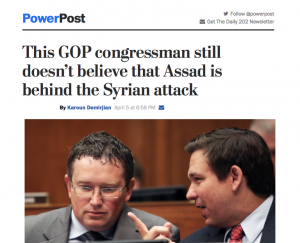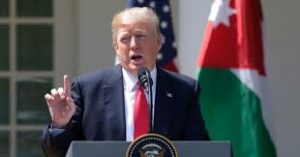Syrian President Bashar al-Assad may be responsible for the recent and gruesome chemical attack in his country. That may be what a thorough investigation concludes.
Until then, asking the tough questions seems wise, even as cruise missiles have already fallen on Syria.
But reporters, even prior to Thursday’s U.S. missile attack on Syria, weren’t entertaining such questions. That was visible in a contentious exchange Wednesday between CNN host Kate Bolduan and Rep. Thomas Massie, who questioned what Assad’s motive for launching the chemical attack would be.
 The Washington Post quickly followed up CNN’s interview with a story portraying the Kentucky Republican’s position as less than credible (“Massie could be increasingly a party of one on this issue”).
The Washington Post quickly followed up CNN’s interview with a story portraying the Kentucky Republican’s position as less than credible (“Massie could be increasingly a party of one on this issue”).
Amidst the Post story’s unflattering framing, Massie’s quotes stand out.
Let me ask you this: Who benefits? Who benefits, if chemical weapons were used and America weighs in on the side of the rebels, or wades into a war against Assad?
Robert Parry, an investigative reporter with ConsortiumNews, asked a similar question.
Since Assad’s forces have gained a decisive upper-hand over the rebels, why would he risk stirring up international outrage at this juncture? On the other hand, the desperate rebels might view the horrific scenes from the chemical-weapons deployment as a last-minute game-changer.
Asking such questions doesn’t mean “Assad’s forces are innocent,” writes Parry, “but a serious investigation ascertains the facts and then reaches a conclusion, not the other way around.”
However the U.S. media was already off to the races, pushing an unpopular president towards an escalation of hostilities, that led to Thursday night’s bombing of Syria.
‘We should stay the hell out of Syria’
Previously Trump indicated he wouldn’t push for Assad’s ouster, but instead would work with the Syrian government’s biggest backer, Russia, to fight the Islamic State.
Back in 2013, after a prior chemical attack near Damascus, it was Trump, via Twitter, who counseled President Obama not to go after Assad.
Here's Trump in 2013, as DC was demanding that Obama attack Syria and effectuate regime change against Assad pic.twitter.com/AchURwWVzs
— Glenn Greenwald (@ggreenwald) April 6, 2017
Now it’s Trump, with the media’s encouragement, who has launched a military attack on Assad.
MSNBC supposedly hates Trump but hasn't had on a single voice who opposes bombing Syria. Right now they're interviewing Marco Rubio.
— Rania Khalek (@RaniaKhalek) April 7, 2017
It’s worth recalling that in regards to the 2013 chemical attack, in addition to Obama, The New York Times said it had proved Assad was responsible, only to later issue a quiet correction of sorts, which few noticed, Parry reported.
Also receiving insufficient attention is who these “rebels” are. While regularly described as “moderates,” the armed opposition to Assad consists of many extremists, as then-Vice President Joe Biden let slip in a 2014 talk at Harvard.
“My constant cry was that our biggest problem was our allies,” Biden said, referring to Turkey, Saudi Arabia, and the United Arab Emirates by name.
They were so determined to take down Assad, and essentially have a proxy Sunni-Shia war, what did they do? They poured hundreds of millions of dollars and tens of tons of weapons into anyone who would fight against Assad – except that the people who were being supplied were al-Nusra, and al-Qaeda, and the extremist elements of jihadis who were coming from other parts of the world.
“What Biden neglected to say,” former ABC News chief Middle East correspondent Charles Glass wrote in Syria Burning: A Short History of a Catastrophe, “was that America’s allies conducted that policy with the knowledge of the United States, which did nothing to stop it.”
Selective Coverage
From the start of the Syrian war, U.S. reporting has been lacking. Important context has been consistently left out, like the fact that since 2006, five years before the “Arab Spring” uprising began, the U.S. sought to destabilize the Syrian government, as diplomatic cables released by Wikileaks revealed.
The overall smearing of Assad has led journalists – who are infrequently based in Syria, and therefore must rely on second-hand reports – to distrust information coming from the Syrian government.
Meanwhile journalists seem less skeptical of reports coming from Assad’s opponents, even though they frequently have ties to extremist groups.
“[T]he rebels have a highly sophisticated media operation – often also foreign-based – proffering immediate details of every incident, often backed up by compelling, if selective, YouTube footage,” veteran Middle East correspondent Patrick Cockburn writes in The Age of Jihad: Islamic State and the Great War for the Middle East.
Understandably, the rebel version of events is heavily biased towards their own side and demonises the Syrian government. More surprising is the willingness of the international media, based often in Beirut but also in London and New York, to regurgitate with so little skepticism what is essentially good-quality propaganda.
In no small part because of the groundwork the media has laid, Trump’s sudden use of force against Syria appears to have earned him praise from both sides of the aisle.
UPDATED: Chuck Schumer and Nancy Pelosi break with Dems to endorse Trump's attack in Syria https://t.co/jUdUNT0mE4 pic.twitter.com/Hp48eQve8u
— Washington Examiner (@dcexaminer) April 7, 2017

